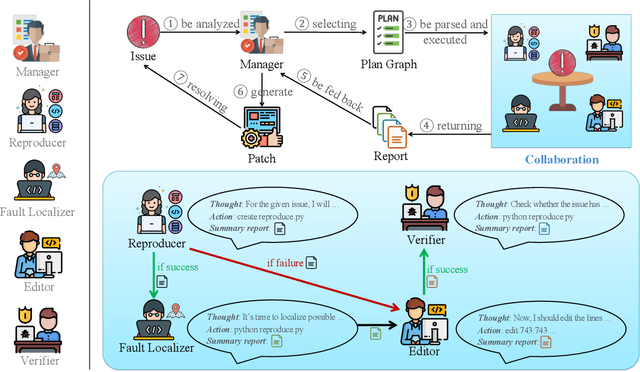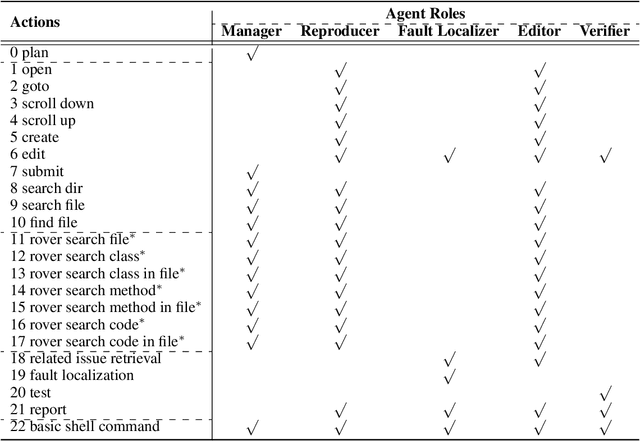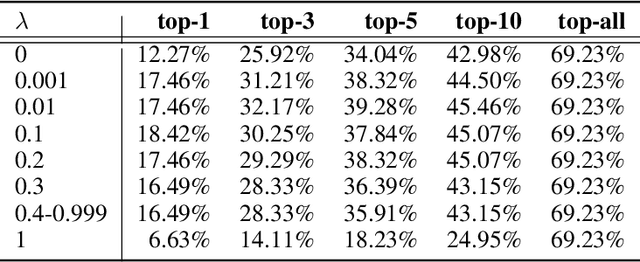Jian-Gang Wang
CodeR: Issue Resolving with Multi-Agent and Task Graphs
Jun 03, 2024



Abstract:GitHub issue resolving recently has attracted significant attention from academia and industry. SWE-bench is proposed to measure the performance in resolving issues. In this paper, we propose CodeR, which adopts a multi-agent framework and pre-defined task graphs to Repair & Resolve reported bugs and add new features within code Repository. On SWE-bench lite, CodeR is able to solve 28.00% of issues, in the case of submitting only once for each issue. We examine the performance impact of each design of CodeR and offer insights to advance this research direction.
CAT: Exploiting Inter-Class Dynamics for Domain Adaptive Object Detection
Mar 28, 2024



Abstract:Domain adaptive object detection aims to adapt detection models to domains where annotated data is unavailable. Existing methods have been proposed to address the domain gap using the semi-supervised student-teacher framework. However, a fundamental issue arises from the class imbalance in the labelled training set, which can result in inaccurate pseudo-labels. The relationship between classes, especially where one class is a majority and the other minority, has a large impact on class bias. We propose Class-Aware Teacher (CAT) to address the class bias issue in the domain adaptation setting. In our work, we approximate the class relationships with our Inter-Class Relation module (ICRm) and exploit it to reduce the bias within the model. In this way, we are able to apply augmentations to highly related classes, both inter- and intra-domain, to boost the performance of minority classes while having minimal impact on majority classes. We further reduce the bias by implementing a class-relation weight to our classification loss. Experiments conducted on various datasets and ablation studies show that our method is able to address the class bias in the domain adaptation setting. On the Cityscapes to Foggy Cityscapes dataset, we attained a 52.5 mAP, a substantial improvement over the 51.2 mAP achieved by the state-of-the-art method.
2PCNet: Two-Phase Consistency Training for Day-to-Night Unsupervised Domain Adaptive Object Detection
Mar 24, 2023



Abstract:Object detection at night is a challenging problem due to the absence of night image annotations. Despite several domain adaptation methods, achieving high-precision results remains an issue. False-positive error propagation is still observed in methods using the well-established student-teacher framework, particularly for small-scale and low-light objects. This paper proposes a two-phase consistency unsupervised domain adaptation network, 2PCNet, to address these issues. The network employs high-confidence bounding-box predictions from the teacher in the first phase and appends them to the student's region proposals for the teacher to re-evaluate in the second phase, resulting in a combination of high and low confidence pseudo-labels. The night images and pseudo-labels are scaled-down before being used as input to the student, providing stronger small-scale pseudo-labels. To address errors that arise from low-light regions and other night-related attributes in images, we propose a night-specific augmentation pipeline called NightAug. This pipeline involves applying random augmentations, such as glare, blur, and noise, to daytime images. Experiments on publicly available datasets demonstrate that our method achieves superior results to state-of-the-art methods by 20\%, and to supervised models trained directly on the target data.
 Add to Chrome
Add to Chrome Add to Firefox
Add to Firefox Add to Edge
Add to Edge